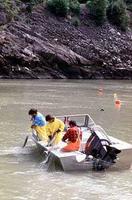Sto:lo
STO:LO ( ) Nation is an alliance of 21 HALKOMELEM communities along the lower FRASER R between NEW WESTMINSTER and HOPE. They have strong cultural ties with other FIRST NATIONS in the FRASER VALLEY and on southern VANCOUVER ISLAND. Their administrative centre, COQUALEETZA, is in the former RESIDENTIAL SCHOOL south of CHILLIWACK. The alliance includes members from Aitchelitz, Chawathil (formerly Hope), Chi:yo:m (Cheam), Qw'ontl'en (Kwantlen), Kwak-wakw-A-pilt, Leq'a:mel (Nicomen), Matsqui, Shxw'ow'hamel (Ohamil), Popkum, Sq'ewlets (Scowlitz), Seabird Island, Ska-wah-look, Skowdale, Skw'atets (Peters), Skway (Chilliwack), Soowhalie, Squiala (Chilliwack), Kw'ekw'i:qw (Sumas), Ch'iyaqtel, Union Bar and Yakweak-wioose First Nations. ARCHAEOLOGICAL evidence suggests that ancestors of the Sto:lo have lived in the Fraser Valley for at least 7,000 years. Before contact with Europeans they relied for subsistence mainly on SALMON, which were plentiful in the Fraser and its tributaries. They inhabited villages of several large longhouses, each shared by members of an extended family (see ARCHITECTURE, ABORIGINAL). Estimates of the pre-contact population vary considerably, but whatever it was, it declined dramatically when SMALLPOX was introduced in 1782. Later epidemics of smallpox and other diseases were less devastating, though still significant, and the population reached a low point of about 1,300 in 1928. Since then the number has grown; in 2001 the Sto:lo numbered about 4,000. They became involved in the FUR TRADE with the establishment of FORT LANGLEY by the HBC in 1827. They were especially important to the trade as suppliers of salmon, which the HBC consumed locally and exported. The Fraser R GOLD RUSH brought the first significant number of outsiders into their territory and by the latter half of the 19th century the Sto:lo were being integrated into the wage economy as road and railway builders, cannery workers and farm hands. They received RESERVES in 1864 but subsequently these were reduced in size and the Sto:lo have been petitioning the government for satisfaction of their land claims ever since (see ABORIGINAL RIGHTS). The Sto:lo entered into negotations with the BC TREATY COMMISSION in 1995.
Reading: Keith Thor Carlson, ed, You Are Asked to Witness: The Sto:lo in Canada's Pacific Coast History, 1997.
-
Internet links

